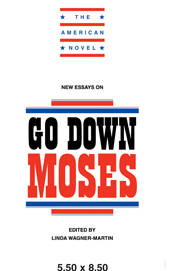Book contents
- Frontmatter
- Contents
- Series Editor's Preface
- 1 Introduction
- 2 Touching Race in Go Down, Moses
- 3 Go Down, Moses and the Discourse of Environmentalism
- 4 Her Shape, His Hand: The Spaces of African American Women in Go Down, Moses
- 5 Who Wears the Mask? Memory, Desire, and Race in Go Down, Moses
- 6 The Game of Courts: Go Down, Moses, Arbitrary Legalities, and Compensatory Boundaries
- Notes on Contributors
- Selected Bibliography
5 - Who Wears the Mask? Memory, Desire, and Race in Go Down, Moses
Published online by Cambridge University Press: 16 January 2010
- Frontmatter
- Contents
- Series Editor's Preface
- 1 Introduction
- 2 Touching Race in Go Down, Moses
- 3 Go Down, Moses and the Discourse of Environmentalism
- 4 Her Shape, His Hand: The Spaces of African American Women in Go Down, Moses
- 5 Who Wears the Mask? Memory, Desire, and Race in Go Down, Moses
- 6 The Game of Courts: Go Down, Moses, Arbitrary Legalities, and Compensatory Boundaries
- Notes on Contributors
- Selected Bibliography
Summary
I BEGIN with these questions: Why “Pantaloon in Black”? Why, twenty years after Faulkner had abandoned his first Laforguean persona and with it those numerous and explicit evocations of the commedia and of the protean Pierrot — the dominant voice of his long self-apprenticeship to poetry — does he (in what many consider the culminating moment in his career as a novelist), explicitly invoke the language and persona of his literary childhood? Why does the structural conception of Go Down, Moses also hark back to those years as Faulkner realizes in prose the elliptical and lyrical form of his early poem sequences? What do these haunted and haunting commedia figures from his difficult and protracted years as a would-be poet have to do with a suicidally grieving black mill worker from Yoknapatawpha County? Why, in short, in a novel about loss and mourning, does Faulkner return to this ghost from his own imaginative life? And why, now, is he figured as black? What do Faulkner's choices signal about the power of memory and, in particular, the power of the memory of interracial love, in the deeply conflicted and racially charged cultural terrain of his own North Mississippi between 1865 and 1940 and in a novel set in that same spatial and temporal time frame? What does the language of these memories say about the pervasive need for this particular south-ern white male writing fiction in 1941 to assume a certain kind of masking?
- Type
- Chapter
- Information
- New Essays on Go Down, Moses , pp. 101 - 128Publisher: Cambridge University PressPrint publication year: 1996
- 9
- Cited by



